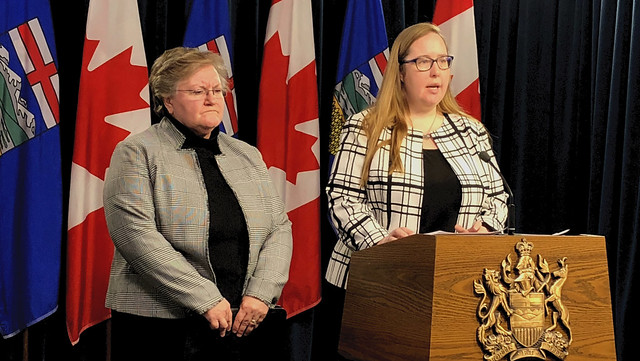This release was issued under a previous government.

Ombudsman and Public Interest Comissioner Marianne Ryan and Minister responsible for Democratic Renewal Christina Gray announce the proclamation of better whistleblower protections.
The act is among the most comprehensive of its kind in Canada and, starting March 1, will better protect whistleblowers in the public sector. Protections will also be extended to employees in political offices.
The Public Interest Disclosure (Whistleblower Protection) Amendment Act ensures that staff in MLAs’, ministers’ and the Premier’s offices will have clear processes that allow for the Public Interest Commissioner to investigate reports of wrongdoing. In addition, processes will be strengthened for how investigations are handled for all public-sector employees and, if a whistleblower suffered punishment or retaliation from their employer, they would be entitled to restitution.
“It’s important that public-sector employees feel safe to report serious wrongdoings and are protected from reprisal. Our new whistleblower legislation is among the more comprehensive in Canada. Alberta public-sector employees will be able to come forward without fear.”
“A safe and healthy workplace is fundamental to the success of an organization. These amendments offer expanded protection for whistleblowers and, in doing so, promote public confidence in the administration of the public service. I look forward to these changes and believe they will encourage both employees and their organizations to embrace a workplace culture where the reporting of wrongdoing is encouraged and supported.”
Key facts:
- Staff in MLAs’, ministers’ and the Premier’s offices will have the same whistleblower protections as other public sector employees.
- The Labour Relations Board will decide what form of remedy, including restitution, should be provided to the whistleblower and will enforce compliance.
- The act will now require more detailed public reporting from the Public Interest Commissioner, including descriptions of wrongdoings and recommendations made. She can also investigate a wider variety of wrongdoings, including bullying, harassment or intimidation, as well as some forms of mismanagement or abuse of human resources.
- The Public Interest Commissioner’s ability to access information will be strengthened so that she can get data and records on site instead of waiting for information to be provided.
- A protocol may be developed between the Public Interest Commissioner and the Speaker of the Legislative Assembly to set out the commissioner’s abilities to investigate matters affecting privileges of the legislature.
- The act clarifies that a whistleblower may approach their boss or the Public Interest Commissioner about a wrongdoing, and their protection from reprisal would start at that moment.
- The bill was developed based on recommendations in the final report of the all-party Select Special Ethics and Accountability Committee, released in 2016.
- The legislation was passed and received royal assent on June 7, 2017. Since then, regulations have been drafted to support the legislation coming into force March 1.